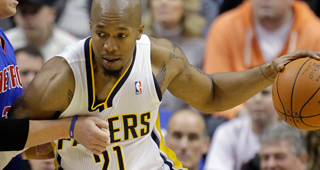With a chance to take a commanding 3-0 lead over the Atlanta Hawks, the Indiana Pacers struggled yet again at Philips Arena on Saturday night, losing 90-69 in Game 3. The Pacers haven’t won in Atlanta since Dec. 22, 2006, when they were led in scoring by Stephen Jackson and rebounding by Jeff Foster.
Indiana’s scoring total was just over half of what they averaged into the first two games (110).
Larry Drew wisely opted for a bigger starting lineup, putting Johan Petro at center and shifting Kyle Korver to the bench. The adjustment allowed Al Horford to matchup against David West and Josh Smith to slide over to Paul George.
The move benefited the Hawks on both ends of the floor as George concentrated on defending Smith early. Smith finished with 14 points on 6-for-13 shooting, a line that would have been bigger if Atlanta hadn’t dominated from tip to horn.
The combination of a tougher defensive assignment and a rangier primary defender curtailed George’s offense. He got to the line (7-for-8), but was just 4-for-11 from the field and scored 16 points in the loss.
Aside from West, 7-for-14 and 18 points, the Pacers looked positively lost on offense. The Hawks scored 24 points off Indiana’s 22 turnovers and there was more standing around and staring than anything else. They shot a season-low 27.2 percent from the field, making nearly as many free throws (21) as shots (22). If you remove West from the equation, the team percentage drops to 22.3 percent.
At one point in the second quarter, the Pacers missed 17 of 19 shots. The Hawks shot poorly from downtown, about the only thing that didn’t go their way in Game 3, but their percentage was more than ten points higher Indiana’s (26.7 percent to 16 percent).
Nothing worked for the Pacers in this one, not even West’s attempt to motivate his troops with a hard foul on Horford midway through the second quarter. It wouldn’t have helped given their abysmal shooting, but Indiana certainly didn’t do themselves any favors either. They complained when calls didn’t go their way and didn’t corral the 50/50 balls they did at home.
It’s hard to imagine a team coached by Vogel coming out in Game 4 with the same lack of aggressive and urgency, but that doesn’t mean they’ll immediately rebound. The following would be a step in the right direction:
Get A Body On Horford
The Pacers feature a frontline with three defenders that can be categorized as above-average in most situations. It looked as though they were surprised to see Atlanta’s taller lineup, which allowed Horford and Smith to play over West and George. The easy way to get Atlanta out of that lineup would be to feed Hibbert early in hopes of getting Petro in foul trouble, forcing Drew to shift Smith/Horford back to the four/five. However, that would only summon Ivan Johnson, who was a game-high +21 on Saturday night. Horford was a monster in this game, notching 26 points and 16 rebounds. He had 27 points and 16 boards in Games 1 and 2 combined. Limiting him has to be Vogel’s top priority. The Pacers can win with Josh Smith going off, but not Horford.
Own The Paint
This relates to stopping Horford, but the Pacers were outscored 50-30 in the paint in Game 3 after winning the battle inside at Bankers Life Fieldhouse. George Hill, Lance Stephenson and George combined to shoot 6-for-26 from the field, but interior scoring leads to better perimeter looks. Hibbert attempted just eight shots in the loss, a number unacceptable despite the scoring margin.
Feeding Hibbert and West in the paint early establishes Indiana’s offense and lends itself to free throws and foul trouble.
An aside: If George is going to be guarded by Smith, Vogel could run more isolation plays through him on the perimeter. Smith is long enough to defend George at the three-point line with some space, but the threat also gives George the choice of what he wants to do. He attempted just two threes in Game 3 after a combined nine in the first two contests.
Take Better Care
Despite the lopsided score, the Pacers matched the Hawks in free throw attempts and won the rebounding battle by four. Owning the basketball is the key to Indiana winning playoff games even if they struggle to score points. The defense was good -- the Hawks shot 42.7 percent -- but the Pacers allowed 13 offensive rebounds.
Dominating the defensive glass isn’t the only way to own the basketball; you also have to limit turnovers. They had as many miscues (22) as field goals (22), never a recipe for success. The Hawks want to compile as many possessions as they can in transition, where the Pacers have looked poor, and they had a field day in that regard.



